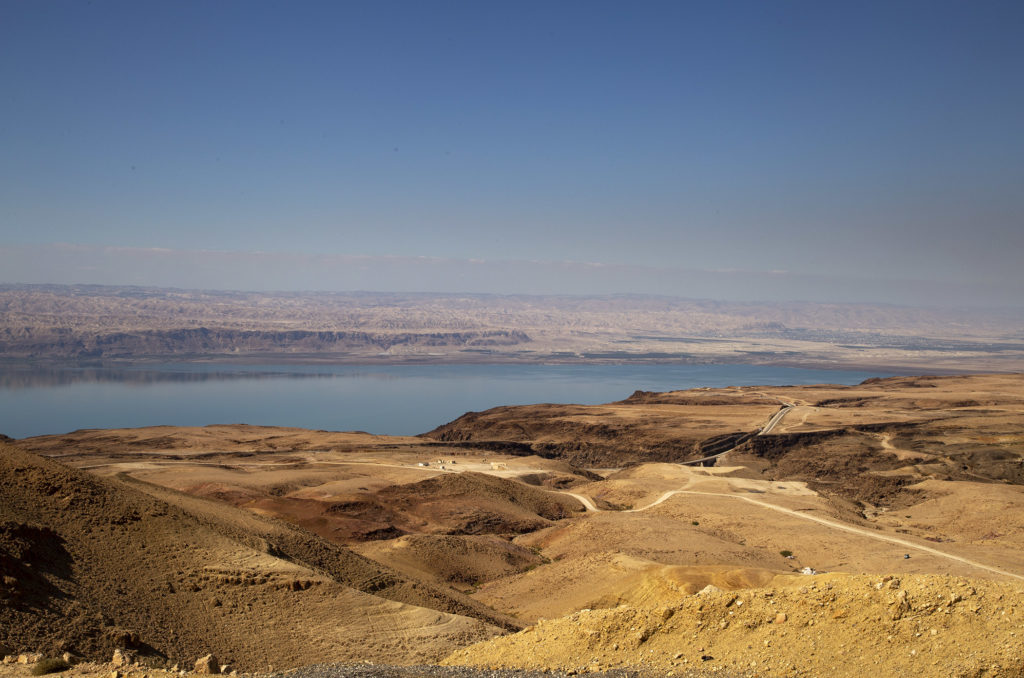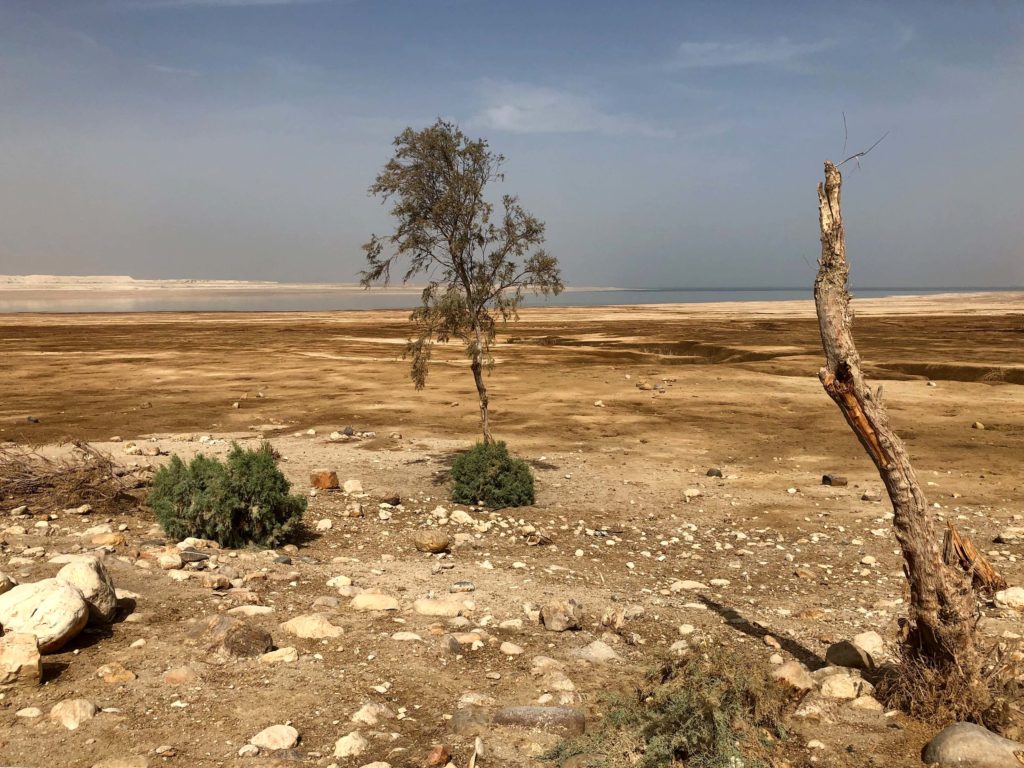
This piece was featured by NBC News
AMMAN, Jordan — At the southern tip of the Dead Sea, Sameer Mahadin recalls when the shoreline was visible from the shaded veranda of his farmhouse. The once 10-minute walk to the water’s edge now takes an hour trekking over cracked, salt-encrusted soil.
The Dead Sea is dying rapidly. The biblical body of water lying between Israel and Jordan is retreating by more than three feet a year, creating sinkholes that swallow up buildings and roads, and forcing the rich seaside landscape on which the tourism industry relies to fade into memory.
It is the saltiest sea on earth. Some experts believe it will be gone by 2050, while others say it will never fully disappear but survive at a fraction of its current size.
But after two decades of discussions about how to resurrect the Dead Sea, there is a glimmer of hope but with a huge price tag: a $1.5-billion project to build a desalination facility in Jordan to transform Red Sea water into drinking water, while pumping the remaining salty brine into the Dead Sea.
Meetings to finalize the technical details and its design are expected within weeks — a major step forward for the project.
There are references to the Dead Sea in the Old Testament and the Quran, making it significant to Christians, Jews and Muslims. One of the oldest known manuscripts of the Hebrew Bible, the Dead Sea Scrolls, were found in the region, and a section of the Jordan River about six miles north of where it flows is also considered the baptism site of Jesus Christ.
The sea is not disappearing without vengeance, though, as roughly 6,000 sinkholes have formed.
“Even the devil is not here,” said water management and environmental engineer Eshak Alguza, as the parched earth that was once underwater crunches and shatters like breaking tiles beneath his feet.
The heavy price of sinkholes has become apparent both in Jordan and on the sea’s Israeli side.
“This is a man-made catastrophe,”
Eshak Alguza, project manager with EcoPeace Middle East.
At least two of the Israel’s beaches and one tourist resort have closed, while parts of Highway 90 have vanished into the earth.
Residents in the community of Ein Gedi have turned into activists, demanding assistance as they watch the land crumble around them. “They feel that their government has abandoned them,” said Clive Lipchin, director of the Transboundary Water Management Center at the Arava Institute in Israel.
There are a multitude of reasons contributing to the decline of the Dead Sea, ranging from damming to mineral extraction. The region’s combative politics are stirred into all of them.
“This is a man-made catastrophe,” said
The sea is fed by the Jordan River and other smaller waterways. Ali Subah, general secretary of Jordan’s water and irrigation ministry, said the flow of the Jordan River has dropped by more than 90 percent from its recorded peak.
The river has been diverted by Israel upstream, while Syria built dams along the Yarmouk River, substantially cutting off the flow that converges with the Jordan.

Data from Jordan’s water ministry shows that rainfall in eight of the 10 years from 2004 to 2014 was below average in volume, depriving rivers and aquifers that rely on it.
Groundwater is among the sources being depleted in an attempt to meet demands. Marwan Al-Raggad, a hydrogeology professor at the University of Jordan, said the Disi aquifer, which is about 1,093 yards underground and feeds the Dead Sea, could run dry in as few as 50 years.
In addition to sources being cut off, seawater is evaporating naturally and quickly. Climate change is expected to cause temperatures in the area to rise 5 to 11 degrees by the end of the century and reduce rainfall by 30 percent.
Mineral extraction is a big industry in the region, and it is also taking a toll. Companies on both sides of the border are pumping an estimated 61.3 billion gallons a year of the seawater, although some critics allege that number is substantially higher. The water is placed in pools so it can evaporate, leaving behind valuable potash, bromine and other substances.
The retreating sea has left behind infertile saline land that, when dissolved by freshwater, becomes unstable and collapses into craters.
Mahadin, 55, said the air is less humid than it was decades ago, forcing him to buy water to irrigate his crops. About one-quarter of the farms in the area have been sold or gone out of business, he said.
A pipe dream
The Red Sea-Dead Sea conveyance project would seemingly resolve multiple issues: filling the gap of the region’s freshwater scarcity, stabilizing levels of the Dead Sea and setting a high bar for peace and collaboration between Israel, Jordan and the Palestinians.
Such cooperation is needed at a time when Jordan and Israel are entering renegotiations over a deal to share land and water that was part of a 1994 peace treaty.
While politics have been blamed for dragging out discussions over two decades, there have also been many technical complications. Among them is that foreign water could change the chemistry of the Dead Sea. Studies estimate that up to 105 billion
Nabil Zoubi, the project director, said Israel and Jordan will pick up one-third of the bill through support of a grant from the U.S. government and loans from the French development fund, European Commission, and the Italian and Spanish governments.
The remaining two-thirds would be footed by the private sector.
After many delays, Zoubi said the project is nearly ready tobe opened to bidders, but a few technical aspects still need to be ironed out.
The best-case scenario would see construction begin in early 2021 and take around three-and-a-half years to complete.
The first phase of the project would produce 62 billion gallons of brine, while after the second phase, another 30.4 billion gallons of brine will be pumped into the Dead Sea. But experts say 10 times that amount is needed to stabilize the sea, meaning the Red-Dead would simply be a drop in the bucket.
The Arava Institute’s Lipchin said a Plan B is required for the agricultural, tourism and other sectors that will inevitably suffer. He argues that political wrangling and excitement about the Red-Dead project are wasting precious time.
Fathi Al Haweimel, an elected government official for the area south of the sea in Jordan, said the area’s religious, political and historical significance leaves little time to waste.
“Saving the Dead Sea is the responsibility of the entire world,” he said.
